- Home
- Claire North
Notes from the Burning Age Page 4
Notes from the Burning Age Read online
Page 4
“I wasn’t good at the pastoral stuff. I was a linguist. My expertise was archaic scripts. I served on the academic review board, studying Burning Age heretical material. My job was to go through recovered servers and translate items for assessment as useful, heretical or somewhere in between.”
The man poured another glass, barely looking at where the liquid fell. “Where was this?”
“Lyvodia.”
“What kind of material did you study?”
I gripped the glass tight, and this time did not drink. My thumb was leaving little bloody marks on the glass, odd droplets and smears on the tabletop. “Whatever came in. We’re finding archives and hard drives all the time. Most of the data is irrecoverable, but sometimes you get a lucky hit; a complex that was sealed against the worst, or something in the landfill mines that still carries data. Most of it is of purely anthropological interest – messages between people in offices, pictures of cats, pornography, and so on. You get a lot of porn. But sometimes you get something good, engineering data or a fiction archive, user manuals or location-tagged images we can compare to archaeological digs. My job was to translate the more challenging material for discussion and classification.”
“How ‘challenging’?” he asked, and there seemed almost a genuine curiosity in him, an academic fascination that did not tally with my present experience of blood and pain.
“Usually bigotry – social media hatred, violence against other humans on an ideological basis – ethnicity, religion, wealth, gender, sexual preference, and so on. Socially endorsed violence makes up more than 97% of heretical materials, in one form or another. It’s unusual to stumble across a practical heresy.”
“Define ‘practical’ heresy.”
“Why?”
“Because I’m asking.”
I rolled the glass between my hands, enjoying the brightness of the fresh blood that stayed behind. “Nerve agents. Ballistic missiles. Chemical warheads. Fossil-fuel fracking, tar sands, deep-sea extraction. Nuclear fission, depending on its use. Things like that. Most of the records left behind are of people justifying their use, rather than actual construction guides. Sometimes you’d be lucky and get a server from an old university or something. Medical information, water purification, materials science, geography, geology, aeronautics – you’d find the occasional wonder.”
“Did you ever find anything?”
“Once or twice. Stem cells, quantum computing. Ancient tracts on economic models, demographic analysis, and so on.”
“What did you think about it? Classifying the world into the sacred or the profane?”
I stared into the still surface of the glass between my fingers, realised I didn’t even like the good stuff, drained it down anyway, felt a glimmer of spite and satisfaction. “I… it wasn’t my job to think about it. I was just a translator.”
The man in the tan coat smiled briefly, slipped a little deeper into his chair, one leg crossed over the other. He had tiny teeth in his chiselled face – a strange, baby-like anomaly in what was otherwise a textbook portrait of classic Burning Age masculinity.
“So how did you get from sitting in a dusty library to here, Medj of the Temple of the Lake?”
I looked up quickly, then away again lest he see something in my face that he disliked. “Why do you care?”
“Because if you are still a priest, you could be a spy. And if you are a spy, tonight will be full of regrets.”
I licked my lips, pushed the empty glass away. “I stole information from the archives. Classified, heretical information. Sold it.”
“What kind of information?”
“Anything. Didn’t matter. Anything I could find. I downloaded it to datasticks and sold it to anyone who wanted to buy.”
“Why did you do that?”
I didn’t answer.
“I know you ran, Ven. I know the guardia are looking for you. I’m a good citizen. I should report you.”
“If tonight is going to be full of regrets, I’d rather listening to bullshit wasn’t one of them.”
To my surprise, he smiled. A little smile – the twitching of lips that are enjoying their control, the flicker of delight in the game – that never left his features. But for a moment there was something human behind his eyes, a hint of someone real. “All right. I’m a bad citizen. I am much worse than the guardia. Is that enough?”
I looked round the room. The two thugs were still leaning against the bar, one now with a drink in his hand, bored, professionally paid not to give a damn, not to listen to things which didn’t bother him. I looked down at my fingers, bloody and still bleeding in a crimson tangle. “It wasn’t fair,” I said.
“I beg your pardon?”
“It wasn’t fair,” I repeated. “I’m… I worked hard. I could read nearly half a dozen archaic languages fluently and recognise a dozen more. I studied technical languages, coding languages, so I could piece together information from damaged drives or systems we didn’t have an operating platform for. I worked while others slept, or ate, or prayed. I was good. I was better than the rest of them.”
“If that’s the case, why are you here? Shouldn’t you be chanting scripture in some wealthy monastery?”
“They said I was worldly. Too concerned with human things. There was this man in the archives, working with me – ‘working’. He didn’t do anything. He just talked and talked as if he knew things, talking to hide how ignorant he was, and I did everything and then he talked and took the credit. And when I complained, they said no tree envies another the light. They said it like it mattered, like there was some great meaning in it. Platitudes. Little sayings, said in a certain way, to disguise the fact that they don’t believe, they don’t care, they don’t ask questions. This is the way it is because that’s how we do it. Honour the stones, they said. Each stone lives, and we lay them down and walk upon them, so give thanks to the stone beneath your feet. What does that even mean? I just wanted… I just wanted them to make people do their jobs, not treat their laziness like it was interesting or okay. I just wanted them to acknowledge that I was better.”
“Some people are better.”
“Temple says that it is pointless to argue if a shark is better than a bat. A shark cannot fly; a bat cannot swim. Why would we call something ‘better’ when it is incomparable?”
“What do you think?”
“I think it’s shit. I think people who can’t do their jobs wrote shit like that to make it okay that someone else is doing their work.”
“That sounds a lot like heresy.”
“I studied heresy. Heresy is forced sterilisation. Heresy is racial profiling, stock buybacks, election tampering. This wasn’t heresy. It was the foundation of the Temple itself. I wanted more. And the only way I could… the best way I could see… I wanted money.”
“Why?”
“Because I earned it.”
“Monasteries have wealth. You could have left the archives and become some fat Medj living off the donations of ignorant people.”
“Not in Lyvodia. The accumulation of wealth is a worldly affair. Wealth begets wealth, not justice or equality. We lived at the mercy of the laity, and what we had that was beyond what we needed, we gave away. Not like here – not like in Maze.”
“You could have left. Gone to a university. Taught. Studied. The Medj release far more archaic data than they hoard. You could have had a good life, with your stem cells and your… little victories. Why sell the data?”
“It shouldn’t be hidden. Our ancestors died discovering this. It belongs to us.”
“That’s very noble. I don’t believe it.”
“Greed is impure,” I snapped. “It is one of the impurities. We take only what we need; the rest returns to the earth. That is what the Medj say. Endless anecdotes about… happy deer or motherly owls. They said I wasn’t ideologically sound. That I did not understand the kakuy.”
“Were they right?”
“I honour the kakuy,” I barked. “I hav
e always honoured them.”
“Why?”
“What do you mean, ‘why’? Because it’s right. It’s what has to be done. They woke when the earth was on fire, they can return us to the flames any time they please, burn the forests, raise the rivers, they can…” I stopped dead, breathing harder than I expected, gripping my bleeding thumb so tight the arteries of my arm pulsed all the way up to my shoulder.
“That isn’t honouring,” he murmured. “That’s fear. You fear the kakuy.”
“Don’t you?” I retorted. “They are the world’s judgement on our ancestors. They are… they are prison guards.”
“I’m not sure you’re right.” He unfolded his legs, stretched out long, like a cat, folded his fingers behind the back of his head, arched his back, relaxed again, smiled. “But please – carry on.”
“There’s nothing more to say. They didn’t listen to me. They said I was suffering from humanist delusions, putting the benefit of a select number of people above the welfare of the whole. They said I’d spent too much time in the archives, read too many journals about ownership, about fantastical social distinctions, about… conquering the earth. Taming it. Geoengineering. Solar mirrors. Cloud seeding. Lime in the oceans, artificial eruptions, carbon dumping, land reclamation. Our ancestors were so clever, so powerful. They were not afraid of fire.”
“But they burned,” he replied. A gentle nudge, a casual correction. “They all burned.”
“The kakuy burned them. If the kakuy hadn’t risen, maybe they could have tamed the world. Maybe they could.”
He sucked in his teeth, long and slow. “Now that does sound like heresy.”
I stared at the dirty wooden floor, resin and wood pounded tight by decades of stamping feet. “What are you going to do with me? I’ll leave Vien. I swear, by… I swear.”
The man nodded, but it did not seem that he nodded at me. He considered the ceiling, stretched again, his body locking into a line from head to toe like the bracing of a bridge, before relaxing back into his seat. “No,” he said at last. “No, I don’t think so. You will stay here. You will continue to work here. My people will check your story. If it is a lie, you’ll die, wherever you go. If not, I will occasionally call on you. That is all.”
So saying, he rose at once, brushed the front of his coat with the palms of his hands in a single, slow, smooth motion, nodded at his men and headed for the door. I stood, wobbling after him, blathered, “No, wait, but… what?”
“Good luck to you, Ven Marzouki. Kadri Tarrad.” A half-wave, back turned to me now as he pushed the door open, letting in the cold Vien air.
“Wait, I—”
He was already gone with his guards, leaving me alone in the cellar, blood on the floor, keys in my pocket, nowhere else to go.
Chapter 5
Of the seven Provinces that send their Voices to the great Council in Budapesht, Maze is categorically the worst.
Though it is rich in land and blessed with great rivers and mountains, sweeping fertile plains and tall, noble forests, it has nothing of the cosmopolitan charm of Anatalia or the breath-catching richness of Lyvodia. To the north, it borders the endless black forests where live the nomadic Rus, who shunned the city and the hearth as heresies against the kakuy and returned instead to the horse and the steppe, leaving only scattered offerings of milk and blood upon the earth. To the west, it borders the shrouded lands that run all the way to the isles of the Anglaes, who hide behind their sea wall, maintaining a purity of race and culture that they claim survived even the great migrations of the burning, when all the peoples became one. When the ships of the Anglaes enter the southern seas for diplomacy or trade, or their convoys appear at the mouth of the Rhene River, their ambassadors wash their hands three times before greeting any of the peoples of the Provinces, then three times upon concluding their business, lest the impure touch of the mongrel races corrupt them.
“Let there be peace between us,” the Medj always say as they greet the shamans and the priests of these distant lands, “lest the kakuy wake.”
However barbaric the peoples of the north may be, on that point at least we could agree. Until, perhaps, now.
Walk through Vien, capital of Maze, and smell the rot setting in.
It is a place of half-remembered monuments, of toppled temples to an ancient god, of the armless statues of forgotten heroes plucked from the mud and set in clusters around the garden parks. Wander past the benches where the lovers sit, beneath bowers of green, paths of scented roses and boxes of carrots and cabbages laid between the lawns, and see here – this figure of time-mottled stone might once have been a great general, or here – he might have been some forgotten king. Now they gaze down at the shrines of timber and mycelium brick grown from the fallen walls of their broken palaces, as though their marble eyes might weep the acid that erased them.
On the west side of the Ube River, great efforts are underway to rebuild some of the former grandeur. The cathedral spire had tumbled when the world burned, but the fallen stones have been painstakingly excavated, and now a new spire rises, and music washes from the open doors. Tourists flood in from Praha and Bukarest to hear the reconstructed ballads of Mozert, Beatless and Beyondsee, performed on the traditional instruments of the time to the booming halls, and several times a year the various monotheist denominations gather for prayers to their one God, calling out in archaic tongues for ancient prophecies to show them the newest way.
By the fat, sluggish river, the great temple of the city flies paper streamers from its wooden porch in spring and rings a booming gong for the dawn of winter, its priests clad in muddy brown bowing to the sun and moon between the high branches of the mottled plane trees. Yet at my first winter festival in Vien, while I had knelt in the snow and given thanks for the ice that keeps the mosquito at bay, for the white that glistens on black, for the fire that drives back the dark, for sunset red and cold dawn light, a novice came to me and exclaimed brightly: “Blessing to keep the flu away? For a small donation, we can offer you the protection of the kakuy for the next three months!”
My jaw nearly hit the floor, for here was the unthinkable: a Medj offering magic, peddling false miracles for cash. In Lyvodia, such a thing would have been outrageous, with both the local priests and, perhaps more relevantly, the local clinics up in arms. As each Province was its own state, sharing those laws in common with its neighbour that were passed by Council, so each Temple of every Province had its own ceremonies and rituals – yet surely none could claim that this was one?
Shuffle from door to door in the bloody winter, and know that beneath your feet the foundations of the city are crumbling like the chalky cliff into the raging sea.
At the spring equinox, when the streets lit up with a thousand lanterns hung from every window and carried by children bouncing on their parents’ backs, the puritans came, rallied from the Delta and Damasc, from Anatalia and the eastern lands by rumours of Maze’s corruption. They paraded between the dancing crowds banging their drums and proclaiming heresy, heresy, heresy! You who shave your beards, who take medicines for your disease, who feast on milk and meat – heretics all! We are of the earth and from the earth comes all our qualities, so why would you try to alter your flesh or fight nature’s course? The cycle is all; you cannot escape it. Heresy!
I followed at a distance until they reached the lines of local Medj in robes of brown and blue, who wound through the streets singing their songs and proclaiming that the path to basically all things – wealth, happiness, romantic fulfilment and good dentistry – came from giving generously to Temple. Come, come, they said. Make your offerings and be free. The bigger the offering, the freer you’ll be.
These two factions, each heretical to the other, faced off on the corner of Leostrad and Altkirchweg, trying to outdo the other in chanting, banging of drums and displays of piety, egging each other on to more dramatic protestations of devotion, up to and including banging their heads against the walls until they bled, crying, “Ou
r blood feeds the kakuy!” or “The kakuy will guarantee an easy pregnancy!”
Eventually the guardia had to split them up, and the pundits on the radio could not keep the contempt from their voices. The next day, Brotherhood members painted crimson murals of the fat Medj of the city and the fanatic, emaciated hermit of the south screaming at each other, spit flying from their grotesque, curling lips. The motto beneath simply said “Pray For Us”, and people tutted and muttered that really, it wasn’t right for those who claimed to be holy to behave that way – not right at all.
Walk through the city, blood pooling in your hand, and sense the thunder that comes before the storm.
The struts of an ancient bridge still stick up from the river, a sign beside their stubby fingers explaining the great engineering of the past, the mighty skills of our ancestors. A dome covered in tall grass where the spotted starlings bicker has been built on a base of marble and steel, and people come from all around to touch the white-polished walls and oooh and aahh and say that truly the builders of the past achieved remarkable things. The Provincial Assembly sits in a former palace, one side tumbled down and replaced with columns of pulped hemp and lime to support the solar glass ceilings where they meld into ancient stone, like the hermit crab nestling its way into the shell of the abandoned snail. On its walls are new reconstructions of ancient paintings – men with hands resting upon the globe they wished to conquer, swords at their sides, moustaches primed and chins high. At the feet of some, the sextant and the lead weight, for these are men who have mastered the earth as well as each other, and thought themselves greater than the fury of the skies.
“Our past was glorious – why should we hide?” demand the Assemblymen, and they have a point, for shame was never as comforting as lies.
In the winding streets far from the river, the hearths are pressed in tight and tall, feeding off each other’s warmth in winter and bathing in each other’s summer shade. Here are slung lines of laundry when the warm wind blows, and beneath them the shady swag of grape, sweet pea and ivy laced from one door to another. Outside every window run tresses of herbs and fragrant flowers, all the way to the roofs of the packed-in houses, where you may pluck some savoury treat to sprinkle on a hot dish from the stove, or whose scent in spring drives back the freshly spawned insects from the river. Shutters are thrown open so neighbours may call to each other in the morning, and behind each cluster of timber-framed housing is a courtyard where the elders tend the biovats that keep the pipes warm and play cards and argue over who is right about a point of forgotten memory.

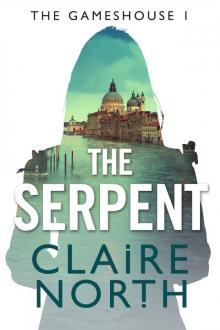 Gamehouse 01 - The Serpent
Gamehouse 01 - The Serpent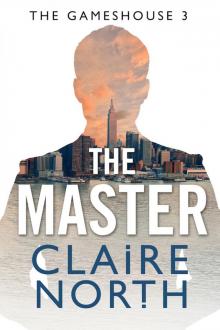 The Master
The Master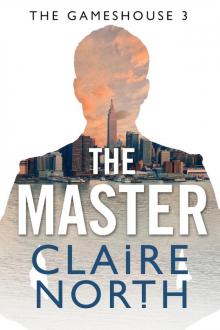 Gamehouse 03 - The Master
Gamehouse 03 - The Master The Thief
The Thief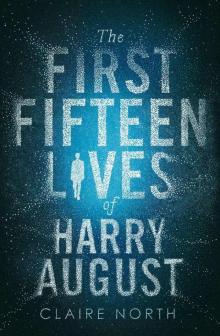 The First Fifteen Lives of Harry August
The First Fifteen Lives of Harry August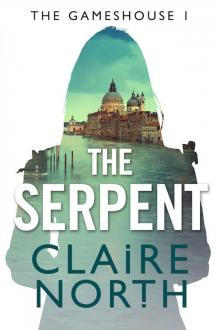 The Serpent
The Serpent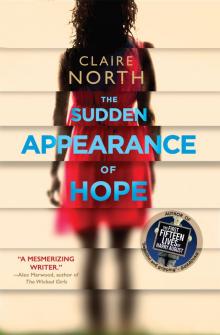 The Sudden Appearance of Hope
The Sudden Appearance of Hope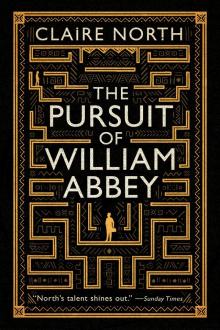 The Pursuit of William Abbey
The Pursuit of William Abbey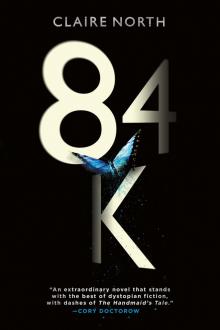 84k
84k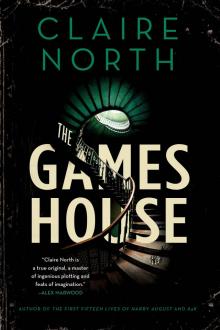 The Gameshouse
The Gameshouse Touch
Touch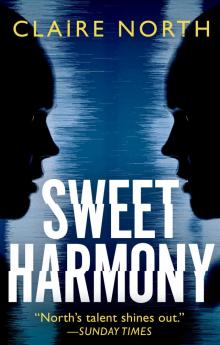 Sweet Harmony
Sweet Harmony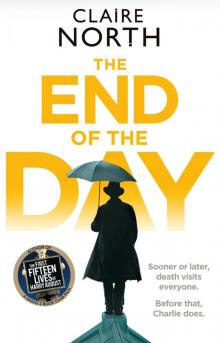 The End of the Day
The End of the Day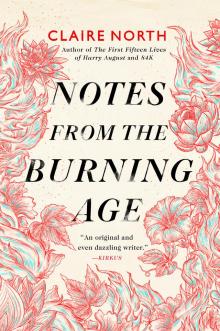 Notes from the Burning Age
Notes from the Burning Age